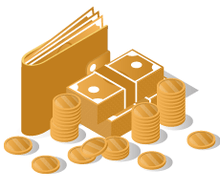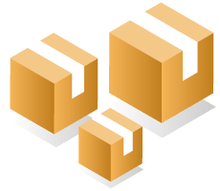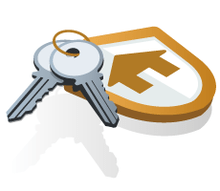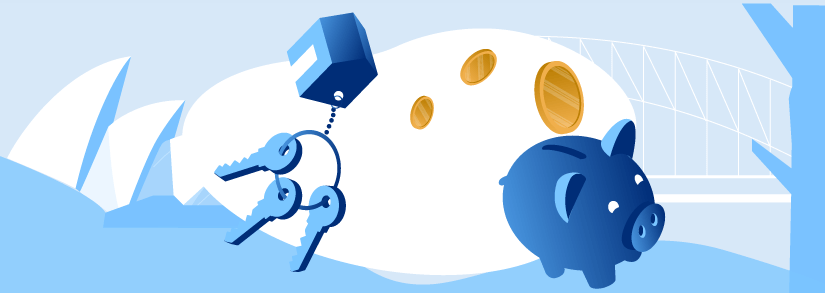The Cost of Renting: Average Rent In Australia 2025
Wondering what the cost of renting a home in Australia is? The true cost of renting goes far beyond your monthly rent payments. In this guide, we will show you exactly what it costs to rent in Australia, what the average rent in Australia works out to be, and what other rental expenses you should budget for when planning to rent.
Moving House? Compare Plans & Sign Up Today with Selectra:
Compare Energy Plans
- 200
- 800
- 801
- 803
- 804
Fill in your current or new (if moving house) postcode to compare recommended energy plans available in your area
What is the Average Rent in Australia?
Everything from the state you live in, the size of your home, and whether you live in a rural community or an urban center will affect your cost of renting.
The table below shows the median weekly cost of renting in Australia:
| Location | Median Weekly Rent for a Unit | Median Weekly Rent for a House | Median Weekly Rent for a Regional House |
|---|---|---|---|
| Sydney, NSW | $490 / week | $600 / week | $480 / week |
| Melbourne, VIC | $375 / week | $445 / week | $380 / week |
| Brisbane, QLD | $420 / week | $480 / week | $450 / week |
| Adelaide, SA | $360 / week | $450 / week | $320 / week |
| Canberra, ACT | $530 / week | $675 / week | N / A |
| Perth, WA | $390 / week | $460 / week | $450 / week |
| Hobart, TAS | $428 / week | $500 / week | $420 / week |
| Darwin, NT | $480 / week | $600 / week | N / A |
| National Average | $436 / week | $499 / week | $417 / week |
Source: Domain Rental Report December 2024 & Rent Property Data Jan 2025
It’s important to note that when referring to average rent in Australia, the median numbers are used for each state or territory as the median is less affected by large and small outliers.
As it's clear to see from the table above, the cost of living in Sydney, Canberra or Darwin is much higher than in the rest of Australia.
Therefore, when calculating your cost of living in Sydney or other locations, you should expect a major chunk of your budget to go toward rental costs.
How much should I pay for rent? In general, rent should be no more than 30% of your monthly income.
If you live in Sydney, NSW and earn $80,000 per year, 30% of your salary would mean you could afford a weekly rent of no more than $462.
Top Questions About Rent
What is the average rent in Sydney?
The average rent in Sydney, NSW is around $2,124 a month for an apartment or around $2,600 a month for renting a house.
The average rent in Sydney for a regional house is around $2,080.
The cost of living in Sydney is considerably higher than in some other parts of Australia, therefore you should expect to have higher recurring rental expenses as well.
Which Australian city has the cheapest rent?
As a whole, Melbourne has the cheapest average rent in Australia. The cost of renting an apartment in Melbourne is around $1,625 a month or $1,928 for renting a house. Although an apartment may be cheaper in Adelaide, overall rent is cheaper in Melbourne.
Now that we have had a look at the average rent in Australia, it's important to understand that the true cost of renting goes far beyond simply paying monthly rent.
To get a better of the true cost of renting, let's take a look at the two types of additional costs people face when renting:
- Upfront costs of renting
- Recurring costs of renting
Calculating the Upfront Cost of Renting in Australia
While not nearly as expensive as buying a new home, the there still are many costs associated with renting an apartment or house.
In this section we will cover the upfront cost of renting in Australia.
Upfront costs of renting are rental expenses that come before you even begin to pay the weekly to monthly rent at your you new place. From paying rent & the security deposit, to the cost of moving and buying things for your new home, the upfront cost of renting can add up quickly.
To help you calculate what the upfront associated cost of renting your new place will be, we have detailed the main expenditures to expect below.
The major upfront rental expenses in Australia include (but are not limited to):

- Rental Application Fee / Apartment Application
- Rental Bond / Security Deposit id="bond"
- Rent in Advance
- Cost of Moving
- Utilities & Connections
- Household Basics

New House? – Get set up now!
Set up utilities at your new home in just one click!
1. Rental Application Fee
A rental application fee or an apartment application fee is just as it sounds.
A rental application fee is an upfront cost of renting whereby you must pay to submit an application to be considered for renting a property.
If the thought of having to pay money just to apply to rent a place makes you sick, not to worry. This is not a common fee, and most Australians won’t need to pay a rental application fee to be considered for the tenancy.
In Western Australia a rental application fee is also commonly referred to as an “option fee”. The average apartment application fee in Australia is between $50 or $100 (depending on the cost of rent and the location of the property).
On the plus side, if you are asked to pay an apartment application fee and your rental application is successful, the fee will be deducted from your first rent payment. If your rental application is unsuccessful, then the money will be returned to you within seven days of your application being denied.
2. Rental Bond / Security Deposit
A rental bond, or security deposit, is paid at the start of a tenancy agreement and is used to offer some amount of financial security to the landlord or property manager in the event that their tenant skips out on paying rent or causes excessive damage to the property.
Rental bonds are very common and almost all tenancy agreements require one. For this reason, we recommend budgeting for a rental bond when calculating the cost of renting a new place.
The amount of rental bond you will need to pay depends on your weekly to monthly rent for the property and the state you live in. However, a rental bond is normally less than four weeks' rent.
Unless you break your lease, you should get your rental bond refunded at the end of your tenancy as long as the property is left in good condition and you don’t have any outstanding payments with your landlord.
| State | Average Cost of a rental Bond |
|---|---|
| NSW | Maximum 4 weeks’ rent |
| ACT | Maximum 4 weeks’ rent |
| VIC | Maximum 4 weeks’ rent if weekly rent is less than $350. If rent is more than $350 (short-term) or $760 (long-term) it could be more than 4 weeks. |
| QLD | Maximum 4 weeks’ rent if weekly rent is less than $700. If rent is more than $700, there is no maximum amount and should be negotiated. |
| SA | Maximum 4 weeks’ rent if weekly rent is less than $250. Up to 6 weeks if weekly rent is more than $250. |
| WA | Maximum 4 weeks’ rent unless weekly rent is $1,200 or higher, in which case the bond is negotiated. |
| TAS | Maximum 4 weeks’ rent |
| NT | Maximum 4 weeks’ rent |
Pet bond If you want to move into a rental with your furry (or scaly or feathered) friend you will need written permission from your landlord. However, it is only legal to ask for a pet bond in Western Australia where landlords are able to ask for a one-off $260 payment to allow your pet to live on their rental property.
3. Rent in Advance
Rent in advance is the amount of rent you pay upfront in order to move into your new home.
Rent in advance is different from a rental bond, and typically they go hand-in-hand meaning that you will be expected to pay a rental bond and some amount of rent in advance.
Depending on your leas agreement you can expect to pay a set amount of your weekly to monthly rent for the advance. Depending on the cost of your weekly to monthly rent and the state you live in, the rules and laws about paying rent in advance differ.
| Location | Average Cost of Rent in Advance |
|---|---|
| NSW | Up to two weeks’ rent in advance |
| ACT | Up to two weeks’ rent in advance |
| VIC | Maximum one months’ rent in advance unless rent is paid weekly. In which case it’s only 14 days’ rent in advance. If rent is more than $900 / week, there is no limit. |
| QLD | Up to two weeks’ rent in advance for periodic agreements or one month for fixed-term agreements |
| SA | Up to two weeks’ rent in advance |
| WA | Up to two weeks’ rent in advance |
| TAS | Usually two weeks’ rent in advance |
| NT | Often only one weeks’ rent in advance |
4. Moving Costs

If you’re moving out of the family home, or student housing, to live on your own for the first time, you might not need to worry about steep moving costs as you might not have a lot of things to worry about moving.
However, if you have a lot to pack up and move, you should consider using a moving checklist as well as:
- Removalist or truck rental costs
- Packing materials including moving boxes, bubble wrap, and packing tape
- Professional cleaning, especially if you’re moving out of an old rental to ensure you get your security deposit back
5. The Cost of Home Utility Connections
These fees can vary widely, but there is usually a cost associated with connecting your new home to the energy grid and to the internet. Home utility connection fees to consider include:
- ELECTRICITY : Electricity connection fees vary depending on your electricity distributor but can be anywhere from $11.58 for Queensland residents up to $86.21 in the ACT.
- GAS : Gas connection fees are set by your natural gas distributor, and start at $7.35 for some Victorian residents up to $55.67 in New South Wales.
- INTERNET : Internet relocation and connection costs vary depending on the internet provider, but many offer special deals for new customers who sign up for a 6 or 12-month contract where connection and set up fees are waived.

New House? – Get set up now!
Set up utilities at your new home in just one click!
6. Household Basics
If you’re moving into your first home, you might be missing some household basics.
Furniture, dishes, cooking utensils, and cleaning supplies can all add up so it’s best to budget ahead of time. For bigger home items, check your local online secondhand marketplace for gently used furniture and appliances, and make sure you have all the basic cleaning and cooking necessities.
The Recurring Cost of Renting in Australia
Apart from your weekly to monthly rent, you can also expect to have recurring rental expenses.
Recurring costs are things you need to pay for regularly and can be anything like bills, groceries, or public transport.
However, the cost of renting is typically one of the largest recurring payments that people account for.
When renting an apartment, your recurring payments may include many of the following:
- Rent
- Utilities
- Phone & Internet
- TV & Entertainment services
- Transportation from your rented property
- and more...
It's a good idea to make a list of all of your recurring payments relating to your property when calculating the true cost of renting, as recurring payments can quickly add up.

Renters Insurance
Some landlords or property management companies require tenants to pay for renters insurance in case of an emergency.
Renters insurance is a type of contents insurance specifically for renters, to protect and cover the cost of furniture, electronics, clothes, jewelry and other valuables.
As a renter, your belongings inside the rented property are your responsibility, particularly in the case of things like natural disasters or break-ins. Therefore, in order to protect your belongings, it's a good idea to consider buying renters insurance.
The cost of renters insurance depends on many factors, such as age, profession, coverage amount et cetera. Prices for renters insurance can run anywhere between $300 to $500 annually, for $50,000 or more in coverage.
However, The average cost of renters insurance in Australia can be found in the table below:
| Location | Average Cost of Renters Insurance Per Year |
|---|---|
| NSW | $431 / year |
| VIC | $377 / year |
| QLD | $397 / year |
| SA | $336 / year |
| WA | $392 / year |
| TAS | $313 / year |
Source: Canstarblue's September 2024 Home & Contents Insurance Star Rating Review. All prices are for plans insured for up to $50,000.
Home Utilities: Broadband & Energy Plans
While we already mentioned these under the Upfront costs of renting, at the end of each month you will also be expected to pay your recurring bill. Therefore home utilities are both upfront costs (due to the connection and installation) and recurring costs (due to the monthly bill).
If you’re able to sign up for your own home broadband plan and energy tariff, it wouldn’t hurt to do a bit of comparison first to ensure you’re getting the best and cheapest deal.
- Compare energy providers
- Discover the cheapest electricity and gas plans
- Compare home internet providers
- Discover the cheapest NBN plans
You will likely need to set up and connect most of your home utilities yourself unless your landlord specifies that he is responsible for them.
How Much Does It Cost to Rent in Australia?
As we mentioned through this guide, the average rent in Australia varies widely depending on where you live. For example, the cost of living in Sydney is much higher than in other parts of the country. You can save significantly on rental expenses by choosing housing in region areas versus the city center.
However, regardless of the state or city you live in, the monthly cost of renting will probably be one of your biggest recurring rental expenses.
A good way to discover how much rent you can afford to be paying is to budget so that your monthly rent never exceeds 30% of your monthly income. This can be tricky when living in city centers. However, below we've compiled some tips for how to save on your weekly to monthly rent.
- Tips for saving on rental expenses:
- Rent an apartment or a unit instead of a large house
- Rent in a regional area versus an urban center
- Consider finding house mates and shared accommodation
- Start renting in the off season when students aren't looking
- Try to negotiate the price.
If you’re struggling to pay your rental expenses, or are experiencing financial difficulties, Rent Assistance is available through Centrelink for eligible Australian residents.
Frequently Asked Questions
What is the average cost of renting in Australia?
The average weekly rent varies by city: Sydney ($490/unit, $600/house), Melbourne ($375/unit, $445/house), Brisbane ($420/unit, $480/house), Adelaide ($360/unit, $450/house), and others. Nationally, median rents are about $436/week for units and $499/week for houses.
What are the usual upfront costs when renting a home?
Upfront costs include rental application fees (if applicable, usually $50-$100), rental bonds (typically 4 weeks' rent), rent in advance, moving expenses, utility connection fees, and purchasing basic household items.
What recurring expenses should renters budget for?
Besides rent, recurring expenses include utilities (electricity, gas, internet), renters insurance (averaging $300-$500 annually), transport, and ongoing household bills like TV or entertainment services.
How much rental bond is typically required?
Rental bonds usually amount to about four weeks' rent but can vary by state and rental price. For example, in NSW and VIC the typical bond is four weeks' rent, while in SA higher bonds may be charged for more expensive properties or pets.
Are there any government supports for renters in Australia?
Eligible renters receiving certain Centrelink payments can access Commonwealth Rent Assistance, which provides financial help with rent costs, based on income and household status.
Any tips for saving money when renting?
Consider renting in regional areas, sharing accommodation, signing shorter leases during off-peak seasons, and negotiating rent with landlords. Using utilities efficiently and shopping around for broadband plans can also help reduce costs.
Click below to find a better deal for your home!

